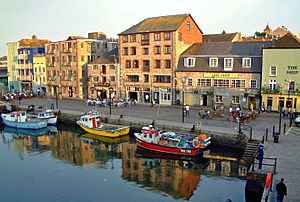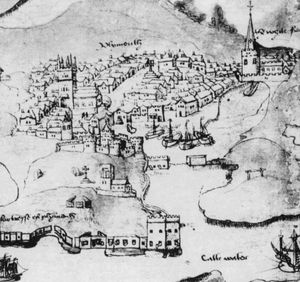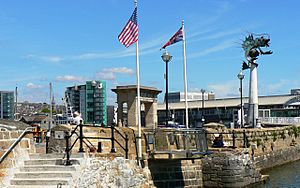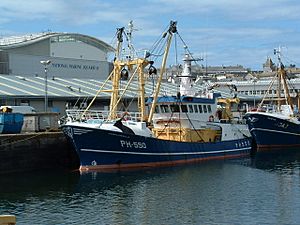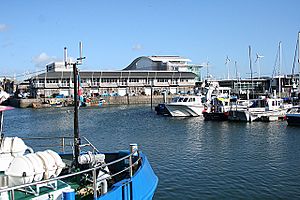Sutton Harbour facts for kids
Sutton Harbour, once called Sutton Pool, is the very first port of the city of Plymouth in Devon, England. It is still a busy place for fishing boats and yachts. One side of the harbour is next to the old Barbican district. Sutton Harbour is famous because it was the last place in England where the Mayflower ship stopped. This ship carried the Pilgrim Fathers to the New World.
Contents
History of Sutton Harbour
The name "Sutton" was the original name for Plymouth. People first settled here around 700 AD. In the Domesday Book, a very old record, it was called Sudtone. This means "south settlement" in the Old English language.
In 1588, Sutton Harbour was the home base for the English fleet. These ships sailed out to fight the Spanish Armada. Later, in the 1700s, the Royal Navy moved most of its ships to Devonport. Bigger trading ships also moved to Millbay Docks. But Sutton Harbour kept being used by fishing boats and smaller coastal trading vessels. In 1993, special Lock gates were added to the harbour entrance.
Cool Places at Sutton Harbour
The Barbican
The Barbican is a very old part of Plymouth. It is on the west and north sides of Sutton Harbour. Its name comes from a fort from the 1400s that protected the harbour. The Barbican is known for having many cobbled streets. It also has over 100 listed buildings, which are old buildings protected by law. Many of these buildings are from the 1500s and 1600s.
The Mayflower Steps
The Mayflower Steps are a famous landmark here. They mark the spot where the Pilgrim Fathers are believed to have left England.
The Leviathan Sculpture
On the West Pier of Sutton Harbour, you can see The Leviathan. This is a huge sculpture of a made-up sea creature. It looks like it's built from parts of different sea animals and birds. A sculptor named Brian Fell created it. The sculpture is made from steel and is about 33 feet (10 metres) tall. People in Plymouth often call it "The Prawn."
Plymouth Fisheries
Plymouth's fish market used to be on the quayside at The Barbican. A new building for the market opened there in 1892. In 1995, an even newer market building opened on the other side of Sutton Harbour. This market has grown a lot! In 1995, it sold about £250,000 worth of fish each year. By 2015, this had grown to £19.4 million!
Today, the market sells 6,000 tonnes of fish and shellfish every year. It is the second largest fish market in England. Around 40 fishing boats bring their catch to Sutton Harbour daily. However, up to 70 percent of the fish sold here comes by road from other fishing ports in the South West of England.
The Marina
In 1972, Sutton Harbour opened its first 70 places for recreational yachts. Today, the Marina has 420 places for boats. Sutton Harbour Holdings PLC manages this Marina.
National Marine Aquarium
The National Marine Aquarium is the biggest marine aquarium in the United Kingdom. It has about 400 different kinds of marine animals. It also has a very deep tank that holds 2.5 million litres (550,000 Imperial gallons) of water. The aquarium opened in 1998. It replaced an older one that was next to the Royal Citadel.
See also
 In Spanish: Sutton Harbour para niños
In Spanish: Sutton Harbour para niños
 | George Robert Carruthers |
 | Patricia Bath |
 | Jan Ernst Matzeliger |
 | Alexander Miles |


